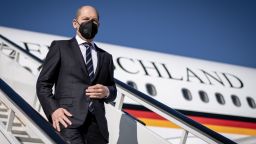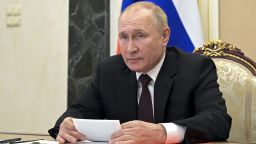Editor’s Note: David A. Andelman, a contributor to CNN, twice winner of the Deadline Club Award, is a chevalier of the French Legion of Honor, author of “A Red Line in the Sand: Diplomacy, Strategy, and the History of Wars That Might Still Happen” and the Substack blog Andelman Unleashed. He formerly was a correspondent for The New York Times and CBS News in Europe and Asia. The views expressed in this commentary belong solely to the author. View more opinion on CNN.
If there was one indication that French President Emmanuel Macron may be well on his way to replacing former German Chancellor Angela Merkel as the leading figure in Western Europe, it is his expanding relationship with Russian President Vladimir Putin.
Macron meets Putin face-to-face in Moscow on Monday before heading to Kyiv the following day for another in-person session with Ukrainian President Volodymyr Zelensky – all while as many as 100,000 Russian troops remain poised on Ukraine’s frontiers.
It’s all part of Macron’s bid to turn what had been a warm relationship with the Russian leader into a full-fledged truce that would end Europe’s brush with an all-out war. The timing could work in Macron’s favor. Putin will return home from his visit to Chinese leader Xi Jinping for the opening of the Beijing Olympics with an agreement on a “no limits” partnership between the two countries, “superior to political and military alliances of the Cold War era.” But of even greater importance to Putin is a 30-year contract for Russian natural gas to be paid for in euros – a nice cushion against any moves by the West to strangle his economy.
But Macron started laying the groundwork for his Moscow visit long before setting foot on Russian soil. Macron has had five phone conversations with Putin since mid-December, according to the Elysée Palace.
Meanwhile, the Kremlin’s records of Putin’s conversations show that in the past two months of accelerating tensions on the border with Ukraine, the Russian leader has spoken just twice each with British Prime Minister Boris Johnson and US President Joe Biden. Even with his close ally, Belarus’ like-minded dictator Alexander Lukashenko, into whose country he’s moved tens of thousands of Russian troops along the border with Ukraine, Putin has recorded only two conversations – the last on January 8.
What that means in terms of Macron’s ability to arrive at some solution to hold off a Russian invasion of Ukraine is, of course, impossible to predict. Indeed, Macron currently has a standing at this moment like no other. For the first six months this year, France has the rotating presidency of the European Union.
So at least until the presidential elections in France in April, or if he is re-elected, through the end of France’s mandate in June, it is quite clear that Macron intends to play to the hilt the authoritative role that he’s drawn. Indeed, Macron told French journalist Fran?ois Clemenceau, a descendant of the World War I French prime minister Georges Clemenceau, that he would not return home to Paris until he’d received at least a signal of a “de-escalation,” adding, “then we will discuss the terms of the de-escalation.”
There is a strong precedent for talks between Putin and whoever in the West serves as his whisperer of the moment. For years, that post was held by Merkel. Putin and Merkel had shared interests and history. The former chancellor grew up in what was then Soviet-controlled East Germany, where Putin served as a KGB officer in Dresden. Putin is quite comfortable speaking German and with their contiguous backgrounds, talked easily, shifting back and forth in the two languages.
In 2014, the year Putin seized Crimea from Ukraine, Merkel and Putin held 35 conversations – just through the month of September. That’s more than three times the number with both former President Barack Obama (10) and almost six times the number with former British Prime Minister David Cameron (six). While Merkel was clearly unable to dissuade the Russian leader from retaining Crimea, Russian moves into the Donbas region of eastern Ukraine never progressed much beyond extended skirmishes in territory that still remains controlled by Kyiv.
Still, Merkel never wavered in her respect for the sanctions imposed by the West or her support for Putin’s expulsion from the G8 group of major powers, which still rankles Putin enormously.
Now, it comes down to Macron. Can he manage somehow to uncork the same magic bottle that held Putin so enthralled? There has always been a certain fascination among Russian leaders with France, back to the days of the czars when French was the language of the royal court. Moreover, there is a striking precedent to the current crisis.
In 2008, a previous French president, Nicolas Sarkozy, played quite an effective role as peacemaker when Russia invaded Georgia, rushing off to the Kremlin, then on to Georgia. As it happens, Sarkozy then held the same title as Macron today – the rotating presidency of the European Union which has now circled through the continent’s 27 nations and returned, stunningly, to France at this epiphanic moment.
Putin must recognize in Macron, as he did with Sarkozy, an individual with a presence and dynamism unlike most other European leaders today. This is something Putin respects.
Still, so as not to insult the German leader Olaf Scholz, on Friday, Putin did finally schedule a meeting with him on February 15, which could suggest he has no plan to invade Ukraine before then.
Europe needs a new leader at this moment. As of now, Merkel’s special powers do not appear to have been transferred to her successor, Scholz, with whom Putin has spoken only once in the past two months – on December 21, just after he hung up the phone with Macron for their second conversation in a week.
So there has been no regular contact between a German and Russian leader since Merkel left office in early December – especially none of the regular contact Merkel encouraged, even in the absence of some crisis of the moment. One of her top military aides once told me that she picked up the phone and called Putin frequently simply so that he would hear another voice different from those in the Kremlin who were whispering their own, often antithetical agendas routinely.
Putin respected her toughness and her longevity in office. There is little of that toughness in Scholz, sitting atop an at best shaky coalition.
In the face of this present East-West crisis, Macron has delayed his official entry into the French presidential sweepstakes, watching a growing list of competitors that’s reached at least three dozen enter the fray. It’s worth noting that Sarkozy never managed to win re-election after his mediation in Georgia.
Now, Macron is determined to build a new vision as his heritage, which he enunciated most recently in his inaugural address to the European Parliament on January 19, observing that “Europe needs to build a collective security order on our continent – a strategic reinforcement of our Europe as a power of peace, a balancing power, particularly in its dialogue with Russia.”
And Putin, perhaps seeing in this aspiration a ready-made device to separate the United States from Europe, seems inclined to assist as a means toward his own end. Of course, if this apparent sleight-of-hand by Macron – carving a separate path forward for Europe – leads to placing any kind of restraint on Putin’s more bellicose ambitions, all the better.
So, should Biden step back just a bit and see if there really is something brewing between Putin and Macron? There is every reason to embrace and encourage the diplomatic route that Macron is seeking to forge. But perhaps there is simply a need for greater coordination between the French way of diplomacy and the heavy tread of American militarism.
A senior Elysée official observed Friday that Macron would be seeking to build a new consensus based on goodwill and confidence with his interlocutor. Now, more than ever, the world needs a Putin-whisperer.




